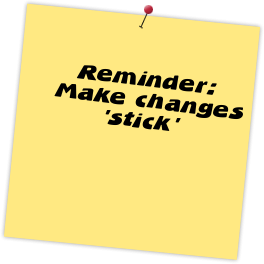3 Tips for running a workshop that 'Wow's'

When you run workshops there is a definite line between failure and success. Your reputation and the piece of work you are looking to have as a focus of your workshop will sink or swim as a result of how well you plan, run and follow up on the workshop itself. To move your workshop into the stratosphere though, explore these three areas:
1) know your audience: I know it sounds really basic but many people underestimate how powerful this can be. Yes, it is good that you are focused on what you want to achieve from holding the workshop but you also need to know who is coming. For two reasons, one is to make sure you get the right people in the room (enthusiasm can plummet when people realise there aren't the subject matter experts or decision makers in the room), but walls so you can tailor the workshop to make the most of everyone's time. Everyone brings with them their dynamics that occur outside the room, so depending on who your audience is you can manage group dynamics. When you ha...
Changing your structure? You need to focus on your organisation's culture...

Often HR programs are focused on organisation design and implementing that design with cursory review of the organisations values. Structures changes will mean nothing if the organisation's culture isn't discussed as a pre-cursor to those changes.
Leaders are simply expected to lead with briefing packs and teams are expected to fall into line throughout the process. Employee disgruntlement during this time is put down to an emotional reaction to the 'uncertainty' of a situation, and their opinions and feedback are often undervalued or ignored. As this happens the productivity and staff engagement declines rapidly. It then takes another 6 -12 months to get back to the basic level of engagement and even longer to rebuild trust once the restructure is complete. Not many organisations can afford to take that hit.
However recently on a change program I led, we developed a comprehensive change and culture strategy to support the entire end to end process. Senior leaders were not just eng...
If I had a dollar for every time someone asked me this I would be rich - very rich

'Can you just put together a comms plan? That's what change is right?' yep every time. The first thing that is requested and the last thing a Change specialist wants to hear. A change specialist is more than a communications person, but that seems to be the only thing expected. So if you have just hired a Change Manager, here is a quick overview of what they will deliver.
Change activities vary depending on who is impacted, how they are impacted and the culture of an organisation. So a Change Manager will be responsible for conducting an impact assessment - first at a high level based on the high level overview of the change. They will be asking 'why are we doing this?' not to challenge but to elicit messages about the 'why' they can put together. They will also be assessing how to measure the change.
Once the details are known they will deep dive and conduct a detailed impact assessment so they can put together a comprehensive Change and communications plan so the impacted individua...
What do you need to make the changes 'stick'?


So you've introduced a new process into the business but you notice that the team continues to do the old process. OR you have been working your butt off on a new system but all the Managers can do is question why THEY have to change the way they are doing things when the current way is working so well.
With all of the effort you have put into your project or change plan you become disheartened when everyone seems to be against the idea, or wanting to do things the old way. Making change happen and having the changes stick starts as soon as you begin work on your project and the thing you need most? Resilience!
I don't think I really knew what resilience was until I became a change manager. Change leaders would think the same thing. It's a tenacity that regardless of the resistance that takes place as a result of the change, that the change will continue to go forward until it is embedded.
What does it take to create resilience?
1) Don't take resistance personally - after all ev...
If your PMO isn't talking Change, then it's only doing half the job!

I am a big fan of coaching and resource based Program and Project Management Offices who also provide consultative Quality Assurance services on programs. Project management is such a great discipline and complimented well by Change Management. Mix that with the Business Analysis function and you have a well rounded discipline that would serve any organisation well. So does your PMO currently have any Change expertise or include Business Analysis support?
Following are just some of the benefits of including Change functions in a PMO:
1) Prioritisation
If you have a PMO that isn't assessing the Program of work based on benefits and impact to stakeholders, to assist with advising on strategic prioritisation then its not offering the right level of support.
After all if you are prioritising based on simple ROI calculations but aren't discussing as a management team the timing of initiatives which ultimately impacts the resource used to deliver the projects as well as realised benefit...
Are workshops a 'waste of time'?

Only a poorly run workshop is a waste of time. Just like a poorly run meeting. There is so much potential in a workshop format. A well run workshop can create momentum, engage your stakeholders and improve your reputation.
Everyone is time poor, and it is annoying when there is a workshop that seems to 'dawdle' or a facilitator that doesn't seem to listen to attendees. However if run well, you can gain major insights and get valuable subject matter expertise input into your topic. It can also create a positive team environment around a project or change.
A few tips on how to run a workshop well:
Know what you want to achieve - and state the purpose of the session in your invite and on the day
Be prepared - know the room, the audience and have a running sheet. It just helps things run smoothly when you can easily navigate the environment.
Follow up - don't just have a session and say 'see ya later - thanks!'. Make sure you follow up with attendees so they know they have added value...
How do you create the 'big mo' with your project or change?

It's all important - creating the big mo (the big momentum). If you are a West Wing fan you will know the term, it was what they had to create in their election campaign, and your project and change program is no different. You need to create the 'big mo' at some stage in your project to ensure delivery and to support the change program.

So how do you create momentum in your project or change program?
1. Be clear and consistent with your messaging at a high level right away and then become more and more specific and more frequent with your messaging closer to the Go live or launch.
Remember confusion kills momentum - clarity creates it.
It is also important to manage expectations well. This means accurately communicating how things will change. Even if the change doesn't have a positive impact to the individuals. Being honest up front saves a lot of unnecessary angst later!
2. Deliver on your promises
Delivering on your promises helps to build trust. One 'promise' is your pub...
You need to understand the undercurrents before you can change the tide

When undertaking a transformative change program the better you understand the 'current state' of your organisation the more likely you are to succeed. Lets face it, all organisations have the 'face' they like to show the outside world, their brand and then there is the real dynamics within an organisation that have it operate. Now internal dynamics aren't a bad thing, they are just dynamics that exist. And if you understand them then you can work with them to ensure change and transformation is embedded. If there are negative undercurrents that exist then you need to understand them to be able to effectively navigate potentially 'rough waters'.
Explore what lies beneath...
Who are the influencers, what connections exist? The who do you need to get on board with your program so it can be a success? Hierarchy is the formal way in which to set up a change success, however if you ignore the informal networks then it is at your own peril. In some organisations the informal network...
Who will you 'be' when leading change in 2019?

The beginning of every year represents a new opportunity to do things differently. To grow and challenge yourself in a new way. As a change specialist or someone who is interested in change leadership and management to grow means to self reflect and learn more about human behaviour in relation to change. And you will grow the most by questioning your own responses to change. In change leadership there is one question to ask over and over again as you lead teams, which ultimately will make you a better leader and achieve better results.
This question is 'who am I being in this change?'. The 'how to lead change' will then flow from this. But the insights you achieve by asking 'who am I being?' are powerful. When I am responsible for leading change and find myself unsettled by changes taking place (after all I am only human), I ask myself 'who am I being in this change for my team?'
This one question helps me be a better leader, as I can choose to modify my approach to get better outco...
Christmas time is a great time to read - and I know just the book!
I wish for you and your family and friends a fabulous Christmas break - whether it be a white Christmas in the northern hemisphere or a hot one in the Southern!
If you want to take some time out for yourself and do some informative reading then I recommend Your Energy. It has so many useful hints and tips which will support you to reflect on what you would like to create in 2019.
Buy it now and explore your world through a new lens.



